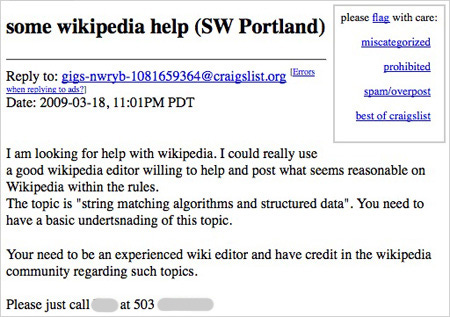Searching for Wikipedia Assistance on Craigslist
Here's an interesting request for Wikipedia assistance on Craigslist, sent to me by a friend and former colleague from my hometown of Portland, Oregon -- coincidentally, also the birthplace of the wiki -- just a few days ago:

I've clipped a bit from the bottom, but it also includes this:
* Location: SW Portland * it's NOT ok to contact this poster with services or other commercial interests * Compensation: $25+ depends on qualifications.
With the math knowledge requirement and low monetary offer, I am not surprised that the ad remains at the time of this writing.
The mention of compensation could well raise concerns among editors who are wary of financial interests influencing content on Wikipedia. While I am sympathetic to this point of view for the simple reason that they are often correct -- people who are willing to put money against getting something changed on Wikipedia are likely to be willing to pay for edits that satisfy their interests but fall short of Wikipedia's goals -- this is also why the Conflict of Interest guideline specifically states: Where advancing outside interests is more important to an editor than advancing the aims of Wikipedia, that editor stands in a conflict of interest. How serious is the advertiser about following this? I'd say the phrase "what seems reasonable on Wikipedia within the rules" has to be pretty close, but what may seem "reasonable" to someone unfamiliar with Wikipedia guidelines may nevertheless conflict with them.
While this request appears to be small ball, it does remind me of the time when a Microsoft employee offered Australian programmer Rick Jelliffe money to edit a Wikipedia article of interest to the company. Presumably knowing he would be sympathetic, Microsoft instructed Jelliffe to use his best judgment, and the controversy only kicked off once Jelliffe himself wrote a blog post about it. Notwithstanding comments from the likes of Jimmy Wales saying he was "disappointed" in the situation, it is unrealistic to expect that interested parties cannot seek to correct inaccurate or incomplete information -- which is what Microsoft says it was doing. Lost in the controversy was the possibility that IBM, Microsoft's rival, may have had people anonymously weighting the article in question.
Ultimately, Jelliffe's biggest mistake was not disclosing the arrangement on the article's Talk page at the time of his edits. This may have meant additional scrutiny on the page, but that comes with the territory. And if anyone takes up this guy's offer, I'd recommend they do the same.
Update, October 4, 2018: I've struck out the last paragraph after being contacted by Mr. Jelliffe identifying an inaccurate claim: that he had made any direct edits to the Microsoft article. As far as I can tell, including looking at the key time period of diffs, he's right. Since the post is nine years old, I don't recall what I had read at the time, and perhaps I hadn't read far enough. Either way, The Wikipedian stands corrected. I still stand by the rest of the commentary, and I should also be clear now that Jelliffe not only did the right thing, he inadvertently played an early role in helping Wikipedia figure out how it should respond to outside interests seeking changes. He deserves credit for that, even as it created quite the firestorm. Was it undeserved? Probably yes, but also Wikipedia was still figuring out what to do about paid contributors and it's easy to say in hindsight this was overblown. It's an interesting footnote, and maybe was even a pivotal moment.


